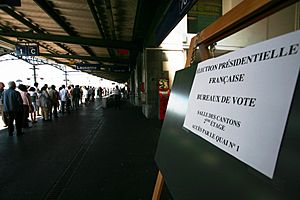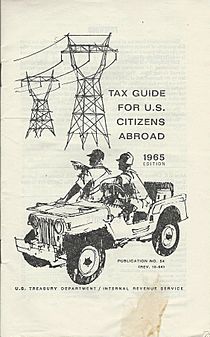Expatriate facts for kids
An expatriate (often called an expat) is a person who lives outside their home country. This word often describes skilled workers or professionals who plan to return to their native country someday. However, it can also mean retirees, artists, or anyone else who chooses to live in a different country. In the past, it sometimes referred to people who were forced to leave their country, known as exiles.

Contents
What Does "Expatriate" Mean?
The word expatriate comes from Latin words. Ex means "out of," and patria means "native country" or "fatherland." So, it literally means "out of one's fatherland."
Different Ways People Live Abroad
People use different words to describe those who live in a foreign country.
- An expatriate is someone living outside their native country.
- A migrant often moves to a new place to find work or better living conditions.
- An Immigrant is a person who comes to live permanently in a foreign country.
Sometimes, people use these words differently based on a person's wealth, how long they plan to stay, why they moved, or their nationality. This can sometimes cause arguments, with some people saying the word "expat" has been used in ways that suggest racism.
In older times, "expatriate" could also mean someone who was an exile. The word expatriation can also mean when someone officially gives up their loyalty to their home country. For example, the United States Expatriation Act of 1868 said that people have a natural right to leave their country if they choose.
New words have also been created for different types of expats:
- Dispatriate: An expat who purposely keeps a distance from their home country.
- Flexpatriate: An employee who travels internationally often for business.
- Inpatriate: An employee sent from a foreign office to work at the company's main office in its home country.
- Rex-pat: Someone who has been an expat before and chooses to return to a foreign country.
A Look Back at Expat Life
Over time, travel became much easier with steamships and trains. This made it simpler for people to live in another country for several years or be sent there by their jobs.
Famous Expat Communities
Here are some examples of groups of expatriates who have lived in different countries:
- Artists and Writers in Paris: In the 1920s and 1960s, many American artists and writers, like those from the Lost Generation and Beat Generation, moved to Paris, France.
- British in India: From the 1700s to the 1940s, many British people lived in India during the time of the British Raj. They were often called "Anglo-Indians."
- Retirees in Spain and France: Since the 1970s, many British retirees have moved to sunny places like the Costa del Sol in Spain or the Dordogne region in France.
- Filmmakers in Hollywood: From the 1910s onward, many filmmakers from Europe moved to Los Angeles, United States, to work in "Hollywood".
- Tax Exiles: Since the 1860s, some wealthy people have moved to places like Monte Carlo, Monaco, to pay less in taxes.
- Third Culture Kids: These are children who grow up in a culture different from their parents' home culture. This often happens when their parents work abroad, like military families or diplomats.
During the 1930s, Nazi Germany took away the citizenship of many people who opposed them, like Albert Einstein. These people and their families were often forced to become expatriates.
It's hard to know exactly how many expatriates there are worldwide because governments don't usually count them. In 2019, the United Nations estimated that about 272 million people, or 3.5% of the world's population, lived outside their home country.
Business Expats: Working Abroad
Many large international companies send their employees to work in offices in other countries. These "business expatriates" help the main company keep better control over its foreign branches and improve teamwork around the world.
People often choose to work abroad for exciting reasons, like having more responsibilities, facing new challenges, having more freedom in their jobs, and experiencing different cultures. This can make them rethink their old ways of doing things.
However, sending employees abroad can be expensive for companies. Expats often get extra money to cover a higher cost of living or difficult conditions in a foreign country. Companies might also pay for things like health care, housing, or fees for international schools for their children. Moving a family and their belongings also costs a lot.
One big challenge for expats is when their spouse has trouble adjusting. This can be due to culture shock, missing their friends, or having to stop their own career. Helping children settle into a new school can also be tough. These are common reasons why foreign work assignments end early.
Some companies now involve spouses earlier in the decision-making process for foreign assignments. They might offer coaching or training to help families adjust before they move. Research shows that good training before leaving can help expats feel more prepared and adjust better.
When an employee returns home earlier than planned or quits their job because of problems abroad, it's sometimes called "expatriate failure." This can be very costly for companies.
Why Do People Move Abroad?
People move abroad for many reasons. Sometimes they are "pushed" away from their home country by things like economic problems or political situations. Other times, they are "pulled" towards a new country by better job opportunities, a nicer climate, or a better quality of life. They might also move to be closer to family or friends already living there.
For some, moving abroad is a carefully planned decision. For others, it might be a spontaneous choice. These decisions are affected by a person's background, where they live, and their personal life changes, like getting married or having children. Different personalities also handle the challenges of adjusting to a new culture in different ways.
Companies and countries want to understand why people move abroad to work. If they know what motivates expats, they can offer better job packages to attract and keep skilled workers from other countries.
New Trends in Working Abroad
In recent years, there have been some new trends for business expatriates:
- Short-term assignments: These are jobs lasting a few months to a year. Families usually don't have to move permanently for these. They might be for specific projects or to share new technology.
- Self-initiated expatriation: This is when individuals find jobs overseas on their own, instead of being sent by their company. These expats often don't need as large a compensation package.
- Commuter assignments: Employees live in one country but travel to another for work, often weekly or every two weeks, spending weekends at home.
- Flexpatriates: These are international business travelers who take many short trips around the world for meetings, training, and negotiations. These trips can be stressful for families because they are irregular.
- In 2017, a report by Mercer found that only 14% of the global expatriate workforce were women.
Expats in Books and Movies
Expat life has been the setting for many stories, often written by authors who lived abroad themselves. These stories explore the challenges and adventures of living in a new culture.
Stories in Books
Many famous books feature characters living as expatriates:
- Henry James wrote about Americans in Europe in novels like The Portrait of a Lady (1881).
- Joseph Conrad wrote about his sea travels and life in distant colonies in books like Heart of Darkness (1899).
- Ernest Hemingway wrote about American men in Europe, starting with The Sun Also Rises (1926).
- Graham Greene often wrote about Englishmen struggling in exotic foreign places, like in his spy novels.
- Paul Bowles set many of his stories in Morocco, his adopted home, including The Sheltering Sky (1949).
- Patricia Highsmith set many of her thrillers abroad, such as The Talented Mr. Ripley (1955).
- Gregory David Roberts wrote the bestselling novel Shantaram (2003) about an Australian criminal who flees to India.
- Janice Y. K. Lee wrote The Expatriates (2016) about Americans living in Hong Kong.
Real-Life Expat Stories (Memoirs)
Some authors have written about their own experiences living abroad:
- Marco Polo's travels to China in The Travels of Marco Polo (around 1300).
- George Orwell described living in poverty while working in Paris in Down and Out in Paris and London (1933).
- Gerald Durrell wrote about his childhood with an eccentric English family on a Greek island in My Family and Other Animals (1956).
- Peter Mayle wrote about his English family adapting to life in Southern France in A Year in Provence (1989).
- Elizabeth Gilbert wrote Eat, Pray, Love (2006) about her search for meaning in Italy, India, and Indonesia.
Expats on the Big Screen (Films)
Many movies show the experiences of expatriates, often dealing with culture shock. Here are some examples, grouped by the country where the story takes place:
- France: An American in Paris, Midnight in Paris, Dirty Rotten Scoundrels.
- India: Best Exotic Marigold Hotel, A Passage to India.
- Japan: Lost in Translation, Mr. Baseball.
- Morocco: Casablanca, The Sheltering Sky.
- United Kingdom: The Adventures of Barry McKenzie, Straw Dogs.
- United States: Coming to America, Crocodile Dundee.
- Various Locations: Eat, Pray, Love.
Expats on TV
Television shows have also explored expat life:
- Reality TV: Shows like House Hunters International and A Place in the Sun focus on people buying homes overseas.
- Dramas: The Jewel in the Crown and Indian Summers show the final years of British rule in India.
- Comedies: Episodes is about British writers in Hollywood, and Ambassadors follows diplomats.
- Mystery: Death in Paradise features British detectives on a Caribbean island.
Images for kids
- Alien (law)
- Asylum seeker
- Clientitis
- Cosmopolitanism
- Diaspora
- Domicile (law)
- Economic migrant
- Emigration
- Émigré
- Ethnic enclave
- Existential migration
- Foreign born
- Foreign worker
- Global mobility
- Human capital flight
- International student
- Migrant worker
- Permanent residency
- Refugee
- Settler
- Statelessness
See also
 In Spanish: Expatriado para niños
In Spanish: Expatriado para niños



